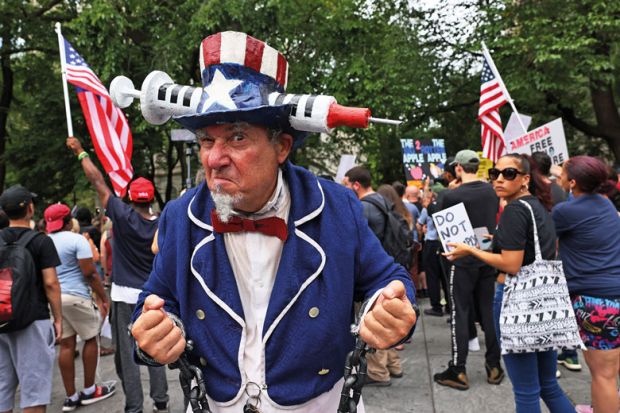The persistent partisan split over Covid in the US is increasingly dividing higher education over vaccination rules, bringing protests, lawsuits, resignations, infections and renewed moves to online teaching.
As with the broader battle lines in US society, the fight against requiring proof of vaccination status is most prevalent in politically conservative areas, often involving local governments forbidding such rules.
The showdowns include faculty resignations or departures at Louisiana State University, Pennsylvania State University, the University of Alabama, the University of North Georgia and Middle Tennessee State University.
On the other side, several institutions have been sued by students for requiring vaccinations on their campuses, including California State University, the University of Massachusetts, the University of Connecticut and the University of Indiana.
And for some universities, even requiring masks is too much. Clemson University and the University of South Carolina are among institutions where academic staff protested and sued just to win the right to expect facial coverings on their students.
Richard Creswick, a professor of physics and astronomy at South Carolina who won a state Supreme Court ruling in favour of the mask requirement, said he could not understand the opposition.
“What is shocking to me”, said Professor Creswick, whose wife is immunocompromised as a result of cancer treatments, “is that some South Carolina politicians will sacrifice the health and lives of South Carolina citizens solely to further their political careers by pandering to and misleading their base on the efficacy of masks.”
Jeremy Fischer abandoned his tenured position as an associate professor of philosophy at the University of Alabama rather than teach in the absence of mandatory student vaccinations. To do otherwise, he said, “might render me complicit in a moral atrocity”.
While he and other departing professors might not get their jobs back, proponents of fundamental public health measures on college campuses are seen as ultimately likely to win, both legally and politically.
The University of Connecticut and the University of Indiana have already successfully defended their right to demand proof of vaccinations on their campuses, and legal experts have said they expect others to prevail as well, given past US Supreme Court rulings on public safety.
Penn State said it could not allow its faculty the right to choose online formats because its accrediting agency would not allow it, but its accreditor and others in the US have long been granting such exceptions.
Public and student opinion also appears clearly on the side of Covid safety rules.
Yet many public university leaders face continuing pressure from conservative politicians running states with far lower rates of Covid vaccinations, far higher rates of infections and far lower numbers of universities that have required their students to be inoculated.
Professor Fischer said senior figures at his institution had all approved his request to teach online in the autumn semester before they subsequently reversed it. He said he also understood the political pressure that university leaders face in a state such as Alabama, which has the lowest vaccination rate of all 50 US states.
Now without a job, he said he sees blame to be widely shared, encompassing state politicians, the university leaders who would not stand up to them, and fellow faculty who were also failing to demand basic health and safety policies.
“A sense of futility among academic instructors, staff and students”, he said, “is perhaps the biggest obstacle to change.”
Register to continue
Why register?
- Registration is free and only takes a moment
- Once registered, you can read 3 articles a month
- Sign up for our newsletter
Subscribe
Or subscribe for unlimited access to:
- Unlimited access to news, views, insights & reviews
- Digital editions
- Digital access to THE’s university and college rankings analysis
Already registered or a current subscriber? Login







